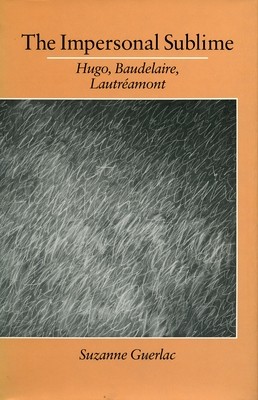
- We will send in 10–14 business days.
- Author: Suzanne Guerlac
- Publisher: Stanford University Press
- ISBN-10: 0804717869
- ISBN-13: 9780804717861
- Format: 15.2 x 22.9 x 1.9 cm, hardcover
- Language: English
- SAVE -10% with code: EXTRA
Reviews
Description
The question of the sublime, which links the idea of aesthetic force with rhetorical impact and moral law, has been an important topic in discussion of eighteenth- and nineteenth-century art and the shift between them. This book argues that the sublime is equally important in understanding the shift from romanticism to modernism later in the century. The author studies the work of three French authors conventionally considered pivotal figures in the trajectory from romanticism to modernism: Hugo, father of romanticism; Baudelaire, precursor of symbolist modernism; and Lautreamont, hero of (post) modernism. She traces this literary-historical as Hugo's Quatre-vingt-treize and L'Homme qui rit, Baudelaire's Spleen de Paris and Petits poemes en prose, and Lautreamont's Chants de Maldoror and Poesies - all seen from a perspective of the aesthetics of the sublime. This perspective is developed through analyses of the treatises on the sublime by Longinus, Boileau, Burke, and Kant.
EXTRA 10 % discount with code: EXTRA
The promotion ends in 18d.11:56:21
The discount code is valid when purchasing from 10 €. Discounts do not stack.
- Author: Suzanne Guerlac
- Publisher: Stanford University Press
- ISBN-10: 0804717869
- ISBN-13: 9780804717861
- Format: 15.2 x 22.9 x 1.9 cm, hardcover
- Language: English English
The question of the sublime, which links the idea of aesthetic force with rhetorical impact and moral law, has been an important topic in discussion of eighteenth- and nineteenth-century art and the shift between them. This book argues that the sublime is equally important in understanding the shift from romanticism to modernism later in the century. The author studies the work of three French authors conventionally considered pivotal figures in the trajectory from romanticism to modernism: Hugo, father of romanticism; Baudelaire, precursor of symbolist modernism; and Lautreamont, hero of (post) modernism. She traces this literary-historical as Hugo's Quatre-vingt-treize and L'Homme qui rit, Baudelaire's Spleen de Paris and Petits poemes en prose, and Lautreamont's Chants de Maldoror and Poesies - all seen from a perspective of the aesthetics of the sublime. This perspective is developed through analyses of the treatises on the sublime by Longinus, Boileau, Burke, and Kant.


Reviews